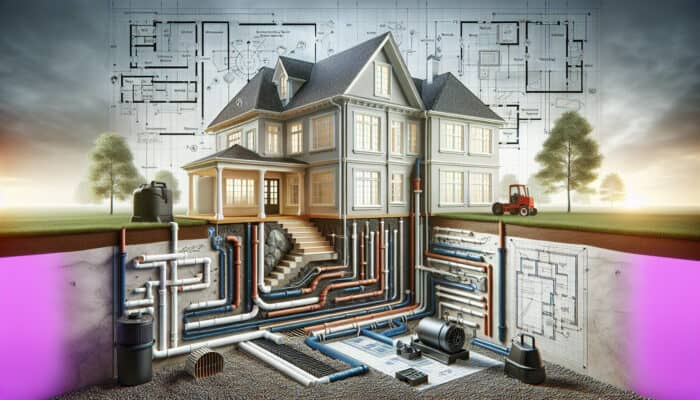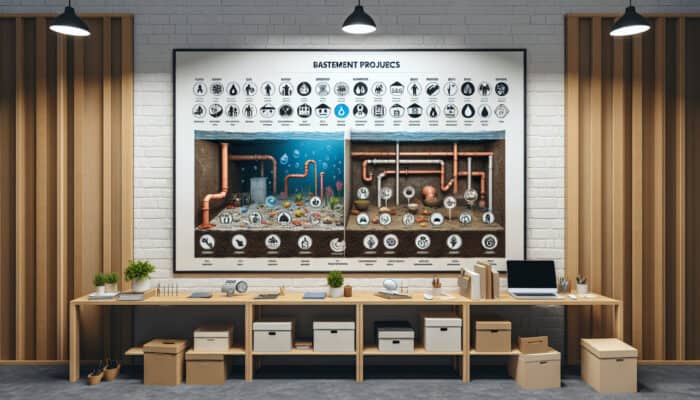Comprehensive Guide to Effective Basement Drainage Solutions in Richmond
Understanding the Components of an Efficient Basement Drainage System

Basement drainage services in Richmond encompass a complex network meticulously designed to effectively manage water accumulation around and beneath residential foundations. This system is essential for mitigating risks associated with water damage, which can jeopardise the structural integrity of homes. The primary objective is to efficiently channel excess water away from the foundation, thereby safeguarding properties. The key elements of a well-functioning basement drainage solution typically consist of:
- Sump Pump: An indispensable device that actively removes accumulated water from the basement to avert potential flooding.
- Drainage Pipes: Specialised pipes designed to efficiently transport water away from the foundation.
- French Drains: Trenches filled with gravel that redirect water away from the foundation.
- Waterproofing Materials: Sealants and membranes that prevent water from infiltrating the basement.
- Drainage Matting: A material that effectively directs water towards the drainage system.
- Grading: The slope of the land surrounding the home, which assists in directing water away.
- Inspection Ports: Access points that allow homeowners to monitor the performance of the drainage system.
These components collaborate seamlessly to create a robust barrier against the distinct challenges posed by Richmond’s climate, ensuring that homes remain both safe and dry throughout the year.
The Importance of Reliable Drainage Solutions in Richmond’s Humid Climate
Richmond’s climate, characterised by its maritime conditions, experiences relatively high humidity levels and considerable rainfall, particularly during the spring and autumn months. This environmental situation creates a landscape where water tends to accumulate around residential properties, making efficient basement drainage systems not just important but absolutely crucial for homeowners. Well-designed drainage systems can drastically diminish the risk of flooding, which could lead to extensive water damage and play a crucial role in preserving the structural integrity of homes over time. Investing in a dependable drainage system transcends being merely an option; it is a necessary measure for ensuring both the longevity and safety of your property, especially in light of the unique weather patterns prevalent in Richmond.
Identifying Common Basement Drainage Issues Faced by Richmond Homeowners
Homeowners in Richmond frequently confront specific challenges related to basement drainage, primarily resulting from the region’s soil composition and topography. Common problems include insufficient soil drainage, in which saturated soils fail to facilitate adequate water percolation, leading to water pooling near foundations. Additionally, elevated water tables, particularly in proximity to rivers or lakes, present another substantial challenge, increasing the chances of basement flooding significantly. Outdated infrastructure, which may involve antiquated drainage systems or inadequately installed solutions, can also contribute to persistent water seepage. If these issues are not addressed promptly, they can result in severe water damage, posing long-term risks to both health and property value.
Essential Considerations When Selecting the Right Basement Drainage Service in Richmond

Key Qualifications to Seek in a Drainage Service Provider
When seeking a basement drainage service in Richmond, it is essential to prioritise qualifications that guarantee both reliability and expertise. Search for companies that possess the necessary certifications and relevant experience in delivering basement drainage solutions. An exemplary service provider should boast a solid track record, supported by positive customer reviews and testimonials. Additionally, it is imperative to confirm that the company is both licensed and insured, protecting against potential liabilities. Key qualifications to consider include:
- State and Local Licensing: Verify that the company holds the required licenses to operate within Richmond.
- Insurance Coverage: Ensure they possess liability and workers’ compensation insurance.
- Industry Certifications: Look for certifications from reputable industry organisations.
- Experience: Opt for companies with several years of experience in the field.
- Customer Reviews: Review online feedback and request references from former clients.
- Service Guarantees: Seek warranties on their workmanship and materials.
- Consultation Offers: A reputable service should provide complimentary initial assessments.
Choosing a qualified service provider is crucial for ensuring that your basement drainage system is installed properly, providing peace of mind and long-term protection for your home.
Strategies for Effectively Comparing Costs and Services
Cost considerations significantly influence the selection of a basement drainage service, as prices can fluctuate widely based on the scope of work and materials used. Start by gathering multiple quotes from various companies to develop a comprehensive understanding of the market. It is vital to compare the offerings in each quote, as opting for the lowest price does not always guarantee the best value. Pay close attention to the quality of materials proposed, as higher-quality products tend to lead to more effective and durable drainage systems. Furthermore, inquire about any additional costs, such as permits or potential assessments, that may be necessary for installation. Gaining clarity on what each quote entails will empower you to make an informed decision that balances cost and quality.
The Importance of Evaluating Past Projects and Client References

Before committing to a basement drainage service, it is prudent to evaluate their previous projects and obtain references. This due diligence provides invaluable insights into a company’s reliability and quality of work. Request photographs of completed projects akin to your own and ask for contact information of previous clients. Engaging directly with former customers can unveil their experiences, including the professionalism of the service provider and the effectiveness of the installed systems. Look for companies that showcase case studies demonstrating their approach to various drainage challenges they have encountered, as these will highlight their problem-solving skills and innovative practices in the field.
Expert Opinions on Basement Drainage Services in Richmond
Exploring the Latest Innovations in Basement Drainage Technology
The realm of basement drainage has witnessed remarkable advancements in recent years, boosting both efficiency and reliability. For instance, smart sump pumps represent a cutting-edge innovation, equipped with sensors that detect water levels and communicate with homeowners through mobile applications, alerting them to potential issues before they escalate. Advanced waterproofing materials, including high-performance vapour barriers and sealants, are designed to provide superior resistance against moisture intrusion, extending the lifespan of drainage systems significantly. Moreover, integrated drainage systems that combine various technologies, such as French drains and sump pumps, offer comprehensive protection against flooding. Many homeowners are increasingly adopting these innovations into their standard construction practices, effectively managing water flow and minimising the risk of damage.
Tips for Homeowners to Maintain Optimal Condition of Their Drainage Systems
Regular maintenance is paramount for ensuring the long-term effectiveness of basement drainage systems. Homeowners can take proactive measures to ensure their systems operate smoothly and efficiently. Begin by checking and cleaning sump pumps every few months to ensure they remain free from debris and function properly. Additionally, it is vital to maintain proper grading around the home to effectively direct water away from the foundation. Conduct regular inspections for leaks in the system; addressing any signs of wear or damage promptly can prevent larger problems. Establishing an annual maintenance schedule, which may include professional inspections, can be beneficial in identifying potential issues before they escalate. Consistent upkeep can prevent water-related damage and extend the lifespan of your drainage systems.
Recognising the Warning Signs of an Underperforming Drainage System
Identifying the early signs of a failing drainage system can save homeowners from incurring costly repairs in the future. Common indicators include water pooling around the foundation, suggesting that water is not being effectively diverted away. Additionally, damp walls in the basement and musty odours often indicate moisture intrusion, which can lead to mould growth. Homeowners should remain vigilant about unexplained increases in humidity levels in their basements. If you notice these warning signs, it is crucial to address the drainage system promptly to avoid more severe issues, such as structural damage or extensive mould remediation.
Factors to Consider When Choosing a Basement Drainage Service in Richmond
When selecting a basement drainage service in Richmond, several key factors can facilitate a successful partnership. First, assess the company’s experience in the field, as well-established providers typically offer a wealth of practical knowledge. Second, customer reviews can provide insights into the quality of service, responsiveness, and overall client satisfaction. Ensure that the company provides service guarantees, as warranties on workmanship and materials can safeguard against future issues. Lastly, evaluate their responsiveness during initial consultations and their willingness to address your questions; maintaining open lines of communication is vital for effective service delivery.
The Detailed Process of Installing Basement Drainage in Richmond
Understanding the Steps Involved in the Initial Assessment and Planning Phase
The installation of a basement drainage system commences with a thorough assessment of the property’s drainage requirements. This process involves several critical steps, including:
- Site Evaluation: A detailed on-site assessment of the property to identify specific drainage challenges and requirements.
- Soil Testing: Evaluating soil composition to ascertain its drainage capabilities and any potential issues that may arise.
- Foundation Inspection: Assessing the condition of the foundation for any vulnerabilities that require attention.
- Water Table Analysis: Understanding the local water table to inform effective drainage solutions tailored to the property’s needs.
- Layout Planning: Designing a drainage plan that is customised specifically to the home’s individual requirements.
- Permitting Requirements: Checking local regulations to ensure compliance with legal standards for drainage installation.
- Client Consultation: Discussing findings with the homeowner to finalise the proposed plan and address any concerns they may have.
A thorough initial assessment is foundational to developing a tailored drainage solution that meets specific property requirements while considering local environmental conditions.
Common Installation Techniques Employed in Richmond
The techniques used for installing basement drainage systems in Richmond can vary significantly based on the unique challenges presented by each property. Common methods include exterior waterproofing, which involves applying waterproof membranes to the foundation walls to prevent water from infiltrating the structure. Interior drainage systems, such as French drains, are frequently installed along the perimeter of the basement to capture seepage and direct it to a sump pump. The installation of sump pumps is particularly critical in areas with high water tables, as these systems actively remove water from the basement to prevent flooding. The choice of technique will depend on factors such as the home’s layout, soil type, and existing drainage infrastructure, ensuring that the method effectively addresses the specific drainage needs of the property.
Follow-Up Steps After Installation: What to Expect
Upon completing the installation of a basement drainage system, a comprehensive final inspection is conducted to verify that everything functions as intended. During this phase, technicians will ensure that all components are correctly installed and fully operational. Homeowners will subsequently receive guidance on maintenance practices to keep their systems running efficiently. This guidance includes instructions on how to monitor for potential issues, such as unusual sounds from the sump pump or signs of water infiltration. Additionally, homeowners should be educated about what to watch for regarding their drainage system’s performance, empowering them to take proactive measures should problems arise.
Permits and Regulations to Consider for Richmond Installations
Before commencing any basement drainage installation project in Richmond, it is vital to comprehend local building codes and secure the necessary permits. Compliance with regulations is crucial not only for legal reasons but also to ensure that the installed system adheres to safety standards. Homeowners should consult with their chosen drainage service provider to initiate the permitting process efficiently. Many professional services will manage permits as part of their service, providing peace of mind for homeowners unfamiliar with local regulations. Ensuring compliance can prevent costly fines and future complications.
Key Cost Considerations for Basement Drainage Services
The cost of installing basement drainage systems in Richmond can vary significantly based on several factors, including the size of the area, the chosen installation method, and any additional work required. A basic interior drainage system may range from a few thousand pounds, while more complex solutions involving exterior waterproofing or extensive excavation can lead to considerably higher costs. Homeowners should carefully consider these factors while budgeting for installation, understanding that investing in a robust drainage system can yield long-term savings by preventing costly water damage in the future. It is advisable to obtain multiple quotes and be transparent about any specific concerns or challenges related to the property to receive accurate estimates.
Advantages of Engaging Professional Basement Drainage Services in Richmond
How Professional Installation Enhances the Homeowner Experience
The professional installation of basement drainage systems provides homeowners with numerous advantages, primarily focusing on the reliability and effectiveness of the solutions implemented. A skilled and experienced technician ensures that all components are accurately sized and installed in accordance with best practices, significantly reducing the risk of system failure. Furthermore, professional services often include comprehensive warranties, giving homeowners peace of mind that any issues arising post-installation will be resolved without incurring additional costs. Ultimately, having experts manage the installation process ensures that homes in Richmond are equipped with dependable drainage systems that provide long-term protection against water damage, enhancing overall safety and comfort in living spaces.
Long-Term Financial Benefits of Professional Drainage Services
Although the initial investment in professional basement drainage services may appear substantial, the long-term financial benefits frequently outweigh the upfront costs. Effective drainage systems can avert extensive water damage, which can lead to costly repairs and renovations over time. Additionally, proactive maintenance and proper installation can significantly extend the lifespan of drainage systems, ultimately saving homeowners from the need for frequent replacements or repairs. By preventing issues such as mould growth and structural damage, homeowners can protect their financial investment and maintain their property’s value. Thus, choosing to engage professional services can prove to be an economically sound decision in the long run.
Enhancing Property Value Through Reliable Drainage Systems
A well-maintained basement drainage system can substantially increase a home’s market value, particularly in areas like Richmond, where water damage poses a significant concern for potential buyers. A robust drainage system not only safeguards the structural integrity of the home but also instills confidence in buyers, knowing that the risk of water-related issues has been effectively mitigated. Homes equipped with reliable drainage solutions tend to generate greater interest in the real estate market, reflecting a lower risk for future problems. This added value can be a decisive factor for buyers, making properties with professional drainage installations more appealing overall.
Data-Driven Insights on Basement Drainage Services in Richmond
Findings on Preventing Basement Flooding: What the Data Shows
Data from various studies indicates that effective drainage systems can reduce basement flooding incidents by up to 90%. This statistic underscores the crucial role that professional installation plays in protecting homes against the risks of water damage. Innovative technologies in drainage systems, such as integrated sensor systems and high-quality waterproofing materials, contribute significantly to this effectiveness. In Richmond, where heavy rainfall can lead to rapid flooding, these insights emphasise the importance of investing in reliable drainage solutions. Homeowners who prioritise professional installation can expect substantial reductions in water-related risks, thereby safeguarding their homes and investments.
The Impact of Basement Drainage Systems on Home Insurance Premiums
Professional basement drainage systems can also positively influence home insurance rates. Insurance companies often prefer to offer lower premiums for homes equipped with dependable drainage solutions, as these systems significantly reduce the risk of water damage. Homeowners can discuss this potential benefit with their insurance providers when obtaining quotes. By investing in professional drainage services, homeowners not only protect their property but may also enjoy financial savings on their insurance costs, further enhancing the overall value of their investment.
Health Benefits of Maintaining a Dry Basement Environment
Maintaining a dry basement yields significant health benefits, primarily by reducing the risk of mould and mildew growth, which can lead to various respiratory issues. A damp environment fosters mould proliferation, posing serious health hazards, particularly for vulnerable populations, including children and older adults. By ensuring proper drainage, homeowners can improve indoor air quality, creating a healthier living environment. Moreover, a dry basement can deter pests, such as rodents and insects, that thrive in moist conditions. Therefore, investing in effective drainage systems not only protects property but also positively impacts the health and well-being of its occupants.
Strategic Approaches to Basement Drainage Services in Richmond
Ensuring Longevity for Your Drainage System: Best Practices
Ensuring the long-term effectiveness of basement drainage systems requires a commitment to regular inspections and proactive maintenance. Homeowners should schedule annual check-ups with professional services to assess the condition of the drainage system, checking for wear and tear or any potential issues that may arise. Cleaning drainage components, such as sump pumps, is critical to maintaining their functionality. Real-world examples illustrate that properties with ongoing maintenance plans tend to experience fewer issues over time compared to those without regular assessments. By prioritising maintenance, homeowners can ensure their drainage systems remain effective and continue to provide robust protection against water damage.
Designing an Effective Drainage System: Best Practices to Follow
Best practices for designing an effective drainage system include ensuring proper grading around the home, utilising high-quality materials that can withstand local conditions, and integrating multiple drainage solutions for comprehensive protection. Grading should direct water away from the foundation, minimising the risk of pooling and infiltration. Incorporating advanced materials, such as durable waterproof membranes and efficient sump pumps, enhances the system’s reliability. Additionally, designing for flexibility in response to changing environmental conditions can further strengthen system effectiveness. By adhering to these best practices, homeowners can establish a robust drainage system that meets their long-term needs.
Choosing the Ideal Materials for Your Home’s Drainage System
Selecting suitable materials for a basement drainage system is crucial and should be based on specific property needs, including soil type, local water table conditions, and existing infrastructure. High-quality waterproofing membranes and durable drainage pipes can significantly affect the system’s effectiveness and longevity. Homeowners should also consider eco-friendly materials, which can provide sustainable solutions while effectively addressing drainage challenges. Consulting with professional services can help identify the best materials tailored to each home’s unique requirements, ensuring a reliable and efficient drainage system that stands the test of time.
Assessing Professional Drainage Services: Steps to Follow
Evaluating professional drainage services involves a thorough assessment of their experience, customer reviews, and certifications. Begin by reviewing their portfolio of past projects to gauge their capability and expertise in addressing various drainage issues. Customer testimonials can provide insights into the quality of service, communication, and overall satisfaction. It is essential to confirm that the company is certified and licensed to operate in Richmond, as this indicates a level of professionalism and adherence to regulatory standards. Finally, inquire about warranties offered on both workmanship and materials, as these assurances can provide additional peace of mind when making your choice.
Avoiding Common Mistakes in Basement Drainage Installation
Homeowners should be mindful of common mistakes that can compromise the effectiveness of basement drainage systems. One significant error is improper grading, which can direct water toward the foundation instead of away from it. Neglecting regular maintenance can lead to system failures, as debris may clog drainage pipes and sump pumps over time. Additionally, using substandard materials can diminish the reliability of the system. Learning from case studies underscores the importance of proper installation, proactive maintenance, and high-quality material selection to prevent future issues. Avoiding these pitfalls ensures that homeowners maintain a reliable and effective drainage system within their properties.
Addressing Frequently Asked Questions About Basement Drainage in Richmond
What Environmental Benefits Do Drainage Systems Provide?
Properly designed basement drainage systems can positively impact the environment by effectively managing water flow and minimising soil erosion. Systems that incorporate sustainable practices, such as rain gardens or permeable paving, can significantly reduce runoff and enhance local water quality. It is essential to consider eco-friendly options when selecting drainage solutions, as these designs can harmonise water management with environmental sustainability. Homeowners who prioritise environmentally conscious materials and methods contribute positively to their community’s ecological health while effectively addressing their own drainage needs.
Navigating Permits and Regulations: A Homeowner’s Guide
Navigating the permitting and regulatory landscape for basement drainage installations in Richmond can be a complex process. Homeowners should familiarise themselves with local building codes and requirements before commencing any work. Certain drainage projects may necessitate permits, which are essential for ensuring compliance with safety standards. It is advisable to consult with the chosen drainage service provider, as many professionals handle the permitting process on behalf of their clients. Understanding local regulations not only avoids legal complications but also ensures that the installation meets all necessary safety and effectiveness standards.
What to Do If Your Basement Floods Despite Having a Drainage System
If flooding occurs even after a drainage system has been installed, immediate action is essential. Assess the extent of the damage and contact your insurance provider to report the incident. Engaging professional remediation services can help manage the aftermath, ensuring that the water is removed safely and effectively. Once the immediate concerns are addressed, evaluate the existing drainage system to identify potential shortcomings or areas for improvement. Professional services can help determine whether any adjustments or upgrades are necessary to prevent future flooding incidents, ensuring that homeowners are better protected moving forward.
FAQs
What is basement drainage?
Basement drainage refers to systems designed to manage and redirect water away from a home’s foundation, thereby preventing flooding and water damage.
Why is basement drainage important in Richmond?
Richmond’s climate can lead to significant water accumulation, making effective basement drainage essential to protect homes from flooding and structural damage.
What are the signs of a failing drainage system?
Signs include water pooling around the foundation, damp basement walls, and musty odours, all indicating possible water intrusion.
How can homeowners maintain their drainage systems?
Regular maintenance includes checking sump pumps, inspecting for leaks, keeping drainage areas clear of debris, and ensuring proper grading around the home to prevent water accumulation.
What should I look for in a basement drainage service?
Look for qualifications such as licensing, insurance, experience, positive reviews, and service guarantees to ensure quality work.
What are the typical costs for basement drainage installation?
Costs vary based on the size of the area and chosen techniques, typically ranging from several thousand to significantly higher for complex solutions.
Can a good drainage system increase my home’s value?
Yes, a well-maintained drainage system can enhance a home’s marketability by preventing water damage and appealing to potential buyers.
What materials are best for drainage systems?
High-quality waterproofing membranes, durable drainage pipes, and eco-friendly options tailored to specific soil and water conditions are ideal choices.
What are common mistakes to avoid in drainage installation?
Common mistakes include improper grading, neglecting maintenance, and selecting substandard materials, which can result in system failures.
How do I handle permits for drainage installation?
Homeowners should familiarise themselves with local regulations and consult with their drainage service provider, as many will manage the permitting process.
Connect with us on Facebook!
Presented By: Basement Drainage in Richmond
The Article: Basement Drainage Services in Richmond: Your Canadian Solution First Published On: https://pacificbluemechanical.ca/
The Article Basement Drainage Services: The Best Solution in Richmond Was Found On https://limitsofstrategy.com


